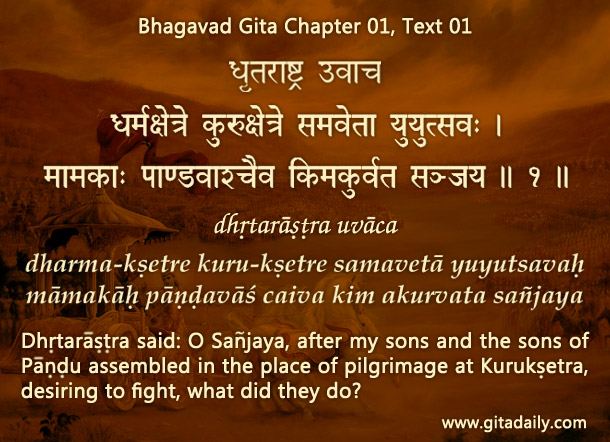The Bhagavad-gita is the song of God, or more precisely, Krishna’s poetic words of philosophical wisdom to Arjuna. Yet it’s noteworthy that the Gita begins not with Krishna’s words or even with Arjuna’s words, but with the words of the Kuru king, Dhritarashtra.
Why does the Gita begin with Dhritarashtra’s words? One reason is that such a beginning is a reminder that the Gita is not an isolated philosophical discussion; it is an integral part of the massive epic Mahabharata. The epic is a rich reservoir of information about Krishna and Arjuna — as well as about the context of their Gita discussion.
To better appreciate how this information matters, consider an example: Suppose we happen to hear a discussion between two scientists. We may or may not find their scientific topics interesting, but suppose we read a book that describes the fascinating life-stories of both those scientists. Suppose further that the book illuminates the context of the discussion between the scientists: they are discussing if and how to develop a hi-tech weapon that can overpower the enemy forces in a war of global proportions. Learning about the scientists and the reason for their discussion can increase both our interest in and our comprehension of their discussion.
Similarly, when we read the Mahabharata, we understand how Krishna and Arjuna are fascinating persons. And we understand that decades of atrocious events, years of sober deliberations and months of fervent peace negotiations have all preceded the Kurukshetra war — and the Gita discussion that occurs just before the war. When we thus read the Mahabharata, our vision of the Gita changes: we see it not just as a philosophical discussion that may or may not interest us, but as a discussion between two fascinating persons that occurs at a climactic point in a gripping book. This changed vision can increase both our interest in and our comprehension of the Gita.
One-sentence summary:
While the Gita can and is often read as a separate book, its intriguing starting section prompts us to see its philosophical discussion in the broader textual and historical context of the Mahabharata.
Think it over:
- What is noteworthy about the Gita’s beginning?
- What is the reason for the Gita’s beginning the way it does?
- How can reading the Mahabharata affect our reading of the Gita?
***
01.01: Dhritarashtra said: O Sanjaya, after my sons and the sons of Pandu assembled in the place of pilgrimage at Kurukshetra, desiring to fight, what did they do?
To know more about this verse, please click on the image


Leave A Comment